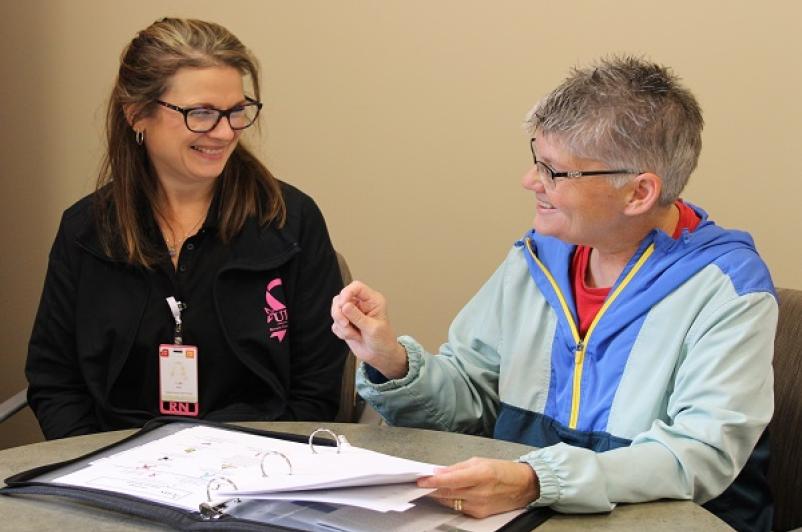
October can be different for everyone. For some, October is a time to enjoy fall activities or get ready for the winter months, but for others, it is a time to wear pink ribbons for Breast Cancer Awareness Month. For nearly four decades, October has been Breast Cancer Awareness Month, an annual campaign to educate the community about the impact of breast cancer and the importance of early detection as well as access to high-quality care. For Wendy Barnum, a breast cancer survivor, October is a time to reflect on her UHS Breast Center experience.
Wendy has been a UHS patient for quite some time and visits the breast center for her annual mammograms. In one of her routine check-ups, Wendy discovered she had dense breast tissue, which meant less fatty tissue and more lumps appearing periodically. She worried every time a lump appeared until she knew it wasn’t anything serious.
In April 2019, Wendy felt a lump in her right breast, and oddly enough, she thought nothing of it. However, she decided to make an appointment for a breast imaging scan. The images of the lump caused some concern, and a UHS breast surgeon consulted Wendy about a biopsy and the expected outcomes. “The surgeon brought me in to discuss that the radiologist report left very little to think the lump wasn’t cancerous, so I had a heads-up,” said Wendy, who appreciated having this transparency during a time of uncertainty.
The next step for Wendy was to have a core needle biopsy (CNB), removing tissue samples from a breast mass using a thin, hollow needle. During Wendy’s biopsy appointment, she met UHS oncology nurse navigator Julia Mack, BSN, RN, CBCN. As a nurse navigator, Julia offered support and guided Wendy through the diagnostic process, being her nurse, advocate and friend. Wendy returned to the Breast Center for her biopsy results, and had Julia there for comfort when the doctor read the results. Wendy was diagnosed with Stage 1 invasive ductal carcinoma, a common type of breast cancer that begins in the ducts and then grows outside the ducts into other parts of the breast tissue. Luckily, the cancer was not aggressive.
A few days after the biopsy, Wendy went into surgery and woke up to good news. The cancer hadn’t spread, and the surgeon successfully removed her lump. Even though the surgery was successful, Wendy still went through a month of radiation as part of her treatment plan. Once her radiation treatment was over, Wendy’s doctor prescribed Tamoxifen, a pill to help reduce the risk of cancer reoccurrence. Wendy switched to a similar pill called Anastrozole a few years later. She still takes this pill, but when spring comes around, Wendy can happily say she is done with her breast cancer treatment when she no longer has to take Anastrozole.
Completing cancer treatment can be an emotional and traumatizing experience, but having a great support system can help. Julia was a big part of Wendy’s support system. “She was critical for me between my prognosis and treatment plan. I went down a rabbit hole of worrying, so every morning I would call Julia and she would talk me out of it. She never made me feel like I was imposing,” said Wendy. To this day, Wendy still visits Julia and the UHS Breast Center team outside her regular appointments. Wendy isn’t the only one who had a lasting impact. Julia says, “We formed a strong bond with Wendy, so every time we see her, it’s a reunion.”
Although Wendy found the lump doing a breast self-exam, she believes having annual mammograms is essential, and Julia could not agree more. “Getting a yearly mammogram is extremely important, so important that if we do find an issue, the cancer is easier to treat at an early stage,” she says. According to the American Cancer Society, women age 40 to 44 should have the choice to start annual breast cancer screenings with mammograms. However, women 45 to 54 should get annual mammograms, and women 55 and older should switch to mammograms every two years, unless they wish to continue yearly screenings.
Every year, people across the country get involved to show their support during Breast Cancer Awareness Month. How can you show your support this October? You can wear your favorite pink clothing, educate your community, or join Wendy and our UHS Breast Cancer team at the Making Strides Against Breast Cancer walk on Sunday, October 15. The noncompetitive walk provides a supportive community for everyone affected by breast cancer. This year, the walk will take place in Otsiningo Park, with food trucks, a mammogram mobile, a UHS raffle tent and more. No matter how you show support, the most important thing is that you’re doing it for patients battling breast cancer, those who lost their lives to the disease, and breast cancer survivors like Wendy.
The UHS Breast Center is located at 4417 Vestal Parkway East in Vestal. To learn more about services provided at the UHS Breast Center, click here.


